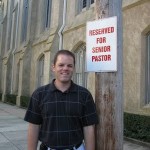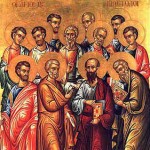Can you “pastor” someone if they can’t get in touch with you?
Chaplain Mike at “Internet Monk” critiques an example of “radical” in his post “A ‘Radical’ Example.” (There’s probably a better way to say that.)
In the post, Mike examines another blog post from a “radical” church planter. At one point (point #8), the “church planter” says this:
8. If you think this will be a nice little church that stays the same size, where everybody knows your name and you have my cell number on speed dial and we have a picnic lunch together every week (By God’s grace, we want to grow).
Mike rightly points out some of the flaws in this statement when he says:
Through this preemptive strike, [this church planter] is laying the groundwork for handling complaints about the lack of pastoral care that will inevitably become common because leaders are so involved in the mission that they don’t have time to visit people in the hospital. He is preparing people for the day when congregation members can no longer talk to him personally. One day they will have to go through layers of administrative bureaucracy and probably still won’t be able to get an appointment because he won’t be the one who deals with the hoi polloi any longer. He’s innoculating them with a view to the day they will be stricken with longing for when they felt like a church family, when they knew the others around them, when they didn’t feel like someone who bought a ticket for a show in the city auditorium. He’s preparing them with the first of many pronouncements that complaints won’t be tolerated about the direction of the church and the decisions of her leaders, because, after all, we have a mission, we are dedicated to that mission, God is blessing that mission by causing us to grow, and therefore we all need to just put our big pants on and get with the program.
(If you want to read all of the original points from the church planter and all of Mike’s responses, use the link above.)
I just have one more point to add to Mike’s critique: If someone cannot get in touch with you, then you are not pastoring that person. If someone cannot spend one-on-one time with you, then you are not pastoring that person. It seems fairly simple to me.
More questions about old men in the church…
Ross at “thejesusvirus” has written a very good post called “What is an Elder Really?”
In his post, Ross is investigating the user of the term “elder” in the New Testament, in the early church, and throughout church history. His goal is to examine the importance of elders in simple/organic churches today.
(Interesting, isn’t it? Since so many people say that simple/organic churches are not interested in elders…)
Ross begins his post with this:
The role of elders is crucial in organic church. However, the idea of what the word “elder†means has been so distorted by history that we need to clear up some misconceptions before we can even talk about what elders do and how they play an essential role in the Church. So this will be a brief, two part series. In this post, I’ll talk about how the word “elder†was used in the Early Church. In the next post, I’ll discuss the important role elders played and how they reproduced themselves organically.
Then, he concludes with this definition of “elder”:
An elder, then, is a more mature Christian. And such a mature Christian would use their maturity to serve others, coming from a position of humility and weakness, not from any position of apparent strength, title, power or positional authority. To do otherwise would be to set aside Jesus strict instructions about how “greater†(i.e. more mature) people were to behave.
What do you think about Ross’ definition?
Speaking of employing pastors/elders and 1 Timothy 5:17-18
In my previous posts (“When elders/pastors don’t have to act like employees“), I listed an advantage to churches and elders when the churches do not employ anyone. Whether we want to face the facts or not, employment and money always changes a relationship, especially when the employment and money are required.
Often, people point to passages like 1 Timothy 5:17-18 in order to justify pastoral employment and salaries. But, this passage has nothing to do with the modern day conception of salaries at all. Notice that in 1 Timothy 5:17-18, the “double honor” (even if it does include some type of financial support) is given in response to an elder’s service of leading and teaching.
Let me say that in a different way. In 1 Timothy 5:17-18, the “double honor” is NOT given so that someone will become or remain an elder/pastor and lead or teach. It is given to someone who has already demonstrated an ability to lead (through serving, I would say) and teach and is given in response to their leading and teaching.
This is not what happens today. In fact, usually, churches know very little about a person before they start paying him or her. This is not what 1 Timothy 5:17-18 is talking about.
When elders/pastors don’t have to act like employees
I’m one of the elders among our church. (You can use the term “pastor” if you prefer it. We don’t have a separate group of pastors and elders.) However, I’m not employed by the church. None of our elders are employed by the church. In fact, we don’t pay any kind of staff at all.
The absence of the employee/employer relationship simplifies and clarifies many relational aspects of the church. For example, one of our elders works in construction. His hours were cut back drastically, so he started looking for a new job. He did not have to hide this from the church. Instead, he was able to share this issue with the church, and we were able to pray for him and encourage him and his family during this time.
A couple of weeks ago, he was offered a new job. This job is in South Carolina. Now, this happens all the time among churches. Elders/pastors get new jobs all the time. They quit their job at one church and are hired by another church. Often, they even move from one state to another state when this happens. But, the employee/employer relationship makes this change much more difficult.
In our elder’s case, we are sad that he and his family are going to be moving (and we are already making plans to visit them). But, there are no difficulties caused by the employment issue. We knew this was coming, and we were praying that God would provide a job for him. We rejoice with this family that God provided the job. We are not disappointed about the job at all. (Although, like I said, we are sad that we will not be able to spend as much time with them.)
Similarly, everyone who is part of our church knows that I’m looking for a teaching position. They know that if God answers this request, it will probably mean that we move out of the area. (Of course, we’re open to other possibilities also.) The church is actually praying that God would answer my request (one way or the other).
Could you imagine a salaried pastor telling a church that he is looking for another job? Or could you imagine him asking the church to pray that God would provide another job? (Yes, I know it happens occasionally. But, generally, the employee/employer relationship hinders this.)
I’m glad that my relationship with others in the church is not hindered or distracted by the employment issue.
(And, yes, I realize that having multiple elders increases the ease of asking the church to pray for a new job that may require one of the elders to move. It’s not all because of the lack of the employee/employer relationship. But that is part of it.)
Here are some more good posts about the old guys, I mean, elders
I’ve written several posts about elders (pastors, if you prefer) before, but I also like to link to other posts that people write on the subject.
In the last few days, a couple of people have written about the importance of church recognizing/appointing multiple elders/pastors. (By the way, if one person is the “head elder” or “senior pastor” such that all others “answer” to him, then I would not consider that “multiple elders/pastors.”)
Here are the two posts:
I think it is very important for churches to consider this. Often, too much focus is placed on leadership in the church, especially when that leadership has a single leader.
We do not need anyone to be “in charge” other than Jesus Christ. However, we do need several mature believers who can guide us by example and who can show us what it means to live in a manner worthy of Jesus Christ in both their words AND their actions. Of course, that also means that those people must share their lives with us, not just their lectures or sermons.
He’s found a senior pastor
My friend Eric at “A Pilgrim’s Progress” has gone off the deep end with his post “What Do I Think of the Senior Pastor.”
If you remember, Eric is the former vocational pastor (but continuing “pastor”) who voluntarily left his paid church position and is now working in manufacturing.
But, has Eric had a change of heart? I mean, over the last few months he has been writing about “house church.” But, now, he’s supporting and cheerleading for senior pastors?
This is the way his post starts:
I believe the senior pastor of the church is extremely important. He is the focus. He is in charge. He provides both key leadership and direction.
The senior pastor gives the vision for the church, provides all the important teachings for the church, and has the right to unquestioned following of his flock.
I almost stopped reading. But, I’m glad that I didn’t stop. Eric has now convinced me of the importance of the senior pastor. Read it and tell me what you think.
Elders at the gates
Felicity at “Simply Church” continues writing about leadership from a simple/organic church perspective in her post “What about elders and deacons?”
Given our recent discussions on my blog (specifically my post “Ministers in Scripture“), I thought my readers might be interested in Felicity’s post as well.
She begins with this:
The problem with words is that they change in meaning over the years. I would love for the word,”church,” to never be used because the word itself conjures up a building with a spire, or a denomination, or a meeting. But the word is Scriptural, and we can learn to use it rightly.
The same is true with words like elders and deacons. The words are Scriptural, but their meaning has become obscured by centuries of tradition.
The word for elder, “presbuteros” literally means an older person, someone who is more mature. He keeps an eye on (oversees) what is going on in the churches. The word for deacon, “diakonos” means servant.
In the remainder of the post, Felicity suggests that “elders” and “deacons” had more of a regional or city-wide function in Scripture. There are some indications that she is correct; but, of course, the church had a regional or city-wide identity in Scripture as well.
What do you think?
(By the way, does anyone know where I got the title of this post? I’m not looking for a specific Scripture reference.)
Answering a question about churches and pastors/elders
My good friend Eric at “A Pilgrim’s Progress” continues his string of excellent blog posts with one called “Should Churches Have Pastors? Why?”
It’s a short post, and it primarily consists of Eric asking the two questions from the title: 1) Should churches have pastors? and 2) Why?
I told Eric in the comments that I thought this was a very good pair of questions and that I wanted to think about them before I answered. This post is my answer.
First, pastoring is a spiritual gift. You can see this most easily in Ephesians 4:11 where “pastors” (those gifted with the spiritual gift of pastoring/shepherding) are listed along with other spiritually gifted people in a context that is about the gifts that Jesus gives. Since Paul said that God arranged the members of the body (speaking specifically of “members” as people with certain spiritual gifts), then if a church needs someone gifted in pastoring, then God will so arrange it. (Of course, this doesn’t discount the fact that every believer is responsible for pastoring – caring for each other – even when they are not so gifted, just as ever believer is responsible for teaching even if they are not spiritually gifted as teachers and every believers is responsible for encouraging even if they are not spiritually gifted as an encourager.)
However, Eric was not talking about the spiritual gift of pastoring. He explains in this excerpt (and then again in the comments):
When I use the term “pastor,” I’m thinking from a biblical as opposed to a traditional perspective. Â As the bible describes pastors/elders/overseers, should churches have them?
So, Eric is asking, “Should church have pastors/elders/overseers? and Why?” Since Eric said “biblical as opposed to a traditional perspective,” I will have to give a quick overview of my understanding of elders. Elders/overseers are older people within the church who have been recognized by the church because of their faith and life in Christ. They primarily serve as examples to others in the church in how to trust Christ and how to live for him by serving others. (Note: These people do not start living a certain way because they are elders/overseers. Instead, the church should recognize those who are already living in a manner worthy of Christ.)
We should recognize that churches existed before elders/overseers were recognized. We see this especially in Acts 14:26, but we probably also see it in 1 Timothy and Titus (depending on when you choose to date those books). So, elders/overseers are not necessary for a group of people to be a church.
Instead, after a group of people are already a church – for a long enough time that they know one another and have observed one another’s livers – then elders/overseers are recognized by the church.
However, it seems that elders/overseers are beneficial to the church when they serve as examples in faith and service. In fact, most of the instructions to or about elders/overseers teach that people do not simply become elders/overseers because of their age, but because of their character, care for others, service to others, and faith in Christ.
I believe it is in this (character, care for others, service to others, and faith in Christ) that we find the benefit of a church recognizing elders/overseers.
So, should churches have pastors/elders/overseers? Why? Yes, if there are mature believers who can be recognized for their faith in Christ and service to others and who live in a way that presents a good example of following Christ that others can follow.
Apostles or Elders?
Andy at “aBowden Blog” wrote a very good article called “Brothers, We Are Not Apostles.”
In the post, Andy examines a common, modern (and perhaps even old) hermeneutic: assigning functions and characteristics of apostles in Scripture to elders/pastors today?
Is this is a valid way to interpret Scripture?
Andy writes:
Perhaps, then, we are wrong in assuming Apostolic functions are transferred to pastors and elders. What would happen if, when reading of the appointing of servants to wait on tables in Acts 6, we assumed that role was passed to pastor/elders. Bartlett writes, “It may also be that the responsibilities assigned to the seven in Acts 6 here have passed on to the elders as well†(Bartlett, Ministry, 133). And Tidball concludes, “There seems great wisdom in the growing consensus that rather than occupying an office, elders were simply those older men [hence the word “elder”] in the congregation who were respected and recognized for their experience and wisdom†(Tidball, 94).
So, Andy thinks there is a difference between apostles and elders/pastors. I agree. What do you think?
Pastor / Church Codependency
Chris at “The Amplified Life” (Isn’t that a great blog title?) has written a very good article called “Neil Cole on Dysfunctional Leadership.”
He quotes from Cole’s book Organic Leadership, and the quote is very good.
But, I also appreciate Chris’ comments on the quote. Chris writes:
According to Cole leaders have enabled this and now we wonder how we got here. We can blame the culture, and many leaders often do because that’s the easy thing to do, but according to this assessment the fault lies with how church leaders have been leading the church. We have fostered a codependent relationship and we struggle to break free from what we have fostered. I think this may account for what I brought up in another post about the role of the pastor today. Pastors have essentially taken on roles that were meant for other Christians but our codependent leadership dynamic has allowed this to happen, then we wonder why thousands of pastors leave the ministry each year.
I agree. There is a codependence problem between many churches and church leaders today. Interestingly, believers do need one another, and they should be able to rely on one another, but this is not what Chris (and Neil Cole) are talking about.
I think it will take both church leaders and churches working together to break this cycle of codependence. The problem is, I’m not sure many want to break their codependent relationship, because they think it’s perfectly fine and even scriptural.
What do you think? What will it take for churches and pastors/leaders to break the codependency that Chris wrote about? Should they?










